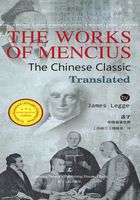
CHAPTER VII
1. Mencius said, 'Is the arrow-maker less benevolent than the maker of armour of defence? And yet, the arrow-maker's only fear is lest men should not be hurt,and the armour-maker's only fear is lest men should be hurt. So it is with the priest and the coffin-maker. Thechoice of a profession, therefore, is a thing in which great caution is required.
2. 'Confucius said, "It is virtuous manners which constitute the excellence of a neighbourhood. If a man, in selecting a residence, do not fix on one where such prevail, how can he be wise?" Now, benevolence is the most honourable dignity conferred by Heaven,and the quiet home in which man should dwell. Since no one can hinder us from being so, if yet we are not benevolent;—this is being not wise.
3. 'From the want of benevolence and the want of wisdom will ensue the entire absence of propriety and righteousness;


This is true, Mencius may well say—'Let men know',or 'If men know'. How is it that after all his analyses of our nature to prove its goodness, the application of his principles must begin with an IF?
CHAPTER 7. AN EXHORTATION TO BENEVOLENCE FROM THE DISGRACE WHICH MUST ATTEND THE WANT OF IT, LIKE THE DISGRACE OF A MAN WHO DOES NOT KNOW HIS PROFESSION.
1. 矢人岂不仁于,—the 不 belongs not to the 岂, but to the仁. If we might construe it with the岂, we should have an instance parallel to 盛于 in ii. 28,—'benevolent as', the于being=如. 函 has the meaning of 'all armour of defence'. 巫,—see Analects, XIII. xxii, where I have translated it 'wizard'. As opposed to 匠 (here= 'a coffin-maker'), one who makes provision for the death of men, it indicates one who prays for men's life and prosperity. But Mencius pursues his illustration too far. An arrow maker need not be inhumane.
2. See Analects, IV. i. The commentators begin to bring in the idea of a profession at 择不处仁, but the whole quotation must be taken first in its proper sense.The 不智 at the end refer to the same characters in the quotation.
3. 无 succeeding 不 shows that the second clause ensues from the first. 由,—used for 犹.


— he who is in such a case must be the servant of other men. To be the servant of men and yet ashamed of such servitude, is like a bowmaker's being ashamed to make bows, or an arrow-maker's being ashamed to make arrows.
4. 'If he be ashamed of his case, his best course is to practise benevolence.
5. 'The man who would be benevolent is like the archer. The archer adjusts himself and then shoots.If he misses, he does not murmur against those who surpass himself. He simply turns round and seeks thecause of his failure in himself.'